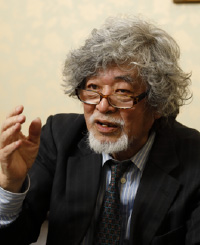The Coronavirus Is Divine Punishment Against the CCP
Interview
Interview
Throughout history, many Chinese dynasties have fallen due to epidemics.
The Xi regime may also fall depending on how they deal with the coronavirus outbreak.

Huang Wenxiong
Huang was born in Taiwan in 1938. In 1964, he went to Japan and completed his Masters degree in economics at Meiji University Graduate School. He is a social critic and a scholar of economic history. In 1994, he won the PEN Club Prize. He has published 200 books in Japan, including the best-selling “Introduction to Conspiracy-ism” (Diamond Press).
We cannot talk about the history of China without talking about epidemics. From the Han to the Qing dynasty, epidemics were a major cause of dynastic decline and collapse.
Why do epidemics happen so often in China? It’s because China undermines the value of human life, which leads to poor hygiene.
For example, in countries like Japan and Taiwan, you would expect people who study medicine to be intellectually outstanding. In China, however, doctors have very low social status, and people who are intellectually substandard go to medical school. Top-scoring people study politics and end up in high government positions.
China has such poor hygiene that many of the epidemics that took place in Japan and Taiwan in the past, came from China. Even the Spanish flu and bubonic plague, which killed many people around the world, are said to have originated in China.
Hong Kong Oppression Is Worse Than Tiananmen
The coronavirus probably looks like divine punishment in the eyes of the CCP, and I think it really is.
A government-related individual from Taiwan told me that the Hong Kong armed police have killed over 500 protesters. This is far more than the number of deaths at the Tiananmen Square massacre that was officially published by the Beijing government. China’s human rights oppressions are that ugly. That’s how evil the state is.
But even the CCP is stuck in a dilemma about Hong Kong and Taiwan. If they send the military into Hong Kong to suppress the protests, all of the foreign investors will withdraw, and this will be a huge blow for China.
Further, Tsai Ing-wen’s reelection in Taiwan has made it difficult for China to make moves there. Some analysts even think that the Beijing government delayed the disclosure of information on the coronavirus because they were waiting to see what would happen in the Taiwan election.
China Uses Biological Weapons
Some people suspect that the coronavirus is a biological weapon. It is true that there is a military-related person from China who had the satanic idea of using “biological weapons against the U.S. to exterminate them like the Native Americans, and create a second Chinese Empire on the land.”
I don’t know if the coronavirus is a biological weapon, but China has a dark history of making similar use of such “weapons.”
One out of every three Emperors in dynastic China were poisoned to death. During the Second Sino-Japanese War, the Chinese military used biological weapons against the Japanese troops. In order to protect themselves, the Japanese military built Unit 731 (a biological and chemical warfare research unit). But after the war, the facts were distorted, and it was used to justify China’s claim that Japan was the evil power behind everything.
Now, Japan should find a way to deal with biological weapons and protect its people against them.
The Possibility of a Revolution
The Xi regime may also fall depending on how they deal with the coronavirus. The struggle for power within the party might also intensify. If an increasing number of people feel displeased about the way the government has handled this problem, it may develop into an anti-government movement.
In other words, there is a high likelihood of a revolution breaking out in China. In reality, China spends more money on maintaining law and order than on their military; and the cost is increasing.
Until now, the CCP was able to soften the people’s dissatisfaction and justify their dictatorial governance all because they had a growing economy. But the coronavirus problem will intensify the people’s demands for better social infrastructure – such as medical treatment – and they will stop supporting the country’s military expansion. The Xi regime is now at a crossroads as to whether they will continue their military expansion, or start investing in infrastructure that shows some respect for human life.
The question is whether they can observe from their people’s perspectives. Divine punishment could continue depending on Mr. Xi’s decision.
Dynasties That Fell Due to Epidemics
The relation between epidemics and the dynasties.
Pandemic The Han Dynasty Falls
An epidemic disease broke out 5 times between the year 171 and 185.
Zhang Jue’s abilities to heal illnesses gained many followers, and in 184 he led the Yellow Turban Rebellion. This significantly weakened the Han, and they entered the Three Kingdoms period.
Bubonic Plague The Sui Dynasty Falls
There were 7 plague epidemics between 610 during Emperor Yang’s (the second emperor) reign until 648 in the Tang dynasty. The Sui dynasty fell in the interim.
Plague Weakens The Yuan Dynasty
Between 1344 and 1362, pandemics including the Black Plague hit the region 11 times, and the population dropped to half of what it was during the dynasty’s zenith. The White Lotus School, founded by mid-12th century monk Mao Ziyuan, gained popularity. Its followers influenced the Red Turban Rebellion, significantly weakening the Yuan dynasty.
Smallpox and Cholera The Ming Dynasty Falls
Diseases such as smallpox and cholera spread from 1573 (late Ming) until 1644 (Qing dynasty), killing at least 10 million people.
Plague Weakens the Qing Dynasty
As the plague spread, major Western powers used it to justify their intervention. Domestically, Hong Xiuquan led the Taiping Rebellion, sending shockwaves throughout the Qing.
Coronavirus Weakens China
The coronavirus is a huge blow for the Chinese economy. Many countries are in a race to relocate their businesses outside of China.



















